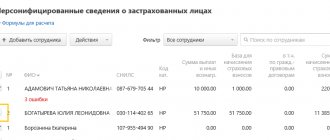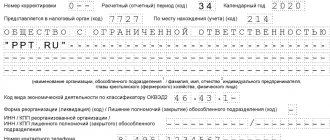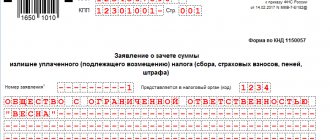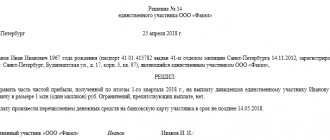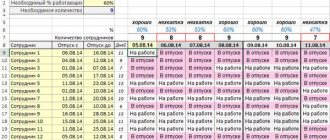From 2021, the key VAT rate will be equal to 20% (subparagraph “c” of paragraph 3 of Article 1 and Part 3 of Article 5 of Law No. 303-FZ of August 3, 2021). In accordance with it, the size of the new settlement rate was calculated, which amounted to 20/120%. Rates of 0% and 10% remain valid.
This article provides detailed instructions for merchants with guidance on how to charge VAT during the transition. All recommendations are based on the explanations provided by the Federal Tax Service in letter dated October 23, 2021 No. SD-4-3/20667. Comments on common customer questions can be found in the Buying Tips chapter. Information on the impact of the rate increase on VAT reporting documents is contained in a separate article.
General procedure for switching to 20% VAT
The new tax rate is automatically applied from 01/01/2019 to all shipments subject to 18% VAT - without exception. Including those contracts that were concluded in 2021 (and earlier) and transferred to 2021.
This means that there is no need to take any special actions in order to “legalize” the transition to an increased VAT rate. Nobody obliges you to change the terms of the contracts either. But, if you deem it necessary, you and your counterparties can adjust the settlement procedure and the contractual value.
Learn in detail how to audit transitional contracts and clarify the wording of their terms.
Still, the automatic transition to a new VAT rate does not mean that it will be easy. We all understand that in practice many problems will arise. Let's consider the main ones, based on the recommendations of the Federal Tax Service of the Russian Federation, given in Letter dated October 23, 2018 N SD-4-3/ [email protected]
Key recommendations for the VAT transition phase
It is necessary to check the requirements of contracts that will begin in 2021. Most likely, these contracts will need to be supplemented with additional information. agreements taking into account the size of the new rate. From an official point of view, an increase in the VAT rate is not a reason for adjusting contracts signed by the parties earlier than 2021 and not implemented as of January 1, 2019. However, the seller and buyer can find out information about the calculation rules and the cost of the contract, taking into account the new tax rate (clause 1.1 letter of the Federal Tax Service dated October 23, 2021 No. SD-4-3/20667).
The main recommendation for sellers: if possible, at least partially fulfill the deliveries planned for January in the last month of the current year, which will make it possible to charge VAT on profits at a rate of 18%. This may also be a good reason for signing acceptance certificates for work performed and services provided in the last month of the current year.
The new 20% rate should only apply to products, work, services or property rights that will be shipped or produced from the beginning of next year. The date of signing the contract does not affect the rate. These rules are contained in paragraph 4 of Art. 5 of Law No. 303-FZ dated August 3, 2021, explanations on them are in letters of the Ministry of Finance dated September 7, 2018 No. 03-07-11/64045, dated August 6, 2021 No. 03-07-05/55290, dated 1 August 2021 No. 03-07-11/53970, as well as in paragraph 1.1 of the letter of the Federal Tax Service dated October 23, 2021 No. SD-4-3/20667.
For users of the “1C: Enterprise Accounting 3.0” configuration, the VAT rate is displayed in documents and reference books according to the following principle: in 2021 – 18%, in 2021 – 20%
For the “Nomenclature” directory, the rate will change automatically.
Advance payment - in 2021, shipment - in 2021: at what rate to deduct VAT
The first and most important thing sellers . If in 2021 you receive an advance on account of future supplies, then VAT on the advance will be calculated at the rate of 18/118 (clause 3.4 of Article 164 of the Tax Code of the Russian Federation). However, when shipping in 2021, you will be charged VAT at a rate of 20%. PDF What VAT is allowed to be deducted when offsetting an advance payment in 2021? Only at the old rate - 18/118.
In 2021, an agreement for the provision of services was concluded between the parties. The price includes VAT, so the total amount under the contract in 2021 will not change due to changes in the VAT rate (20%).
10/24/2018 The selling organization received a 100% advance payment under the service agreement in the amount of RUB 118,000. (including VAT 18% - 18,000 rubles), put SF on advance payment.
On January 15, 2019, on account of the advance received, the Organization provided services worth RUB 118,000. (including VAT 20% - 19,666.67 rubles), put up the SF for sale.
She will only accept advance VAT in the amount of 18,000 rubles for deduction. - the same as was calculated in 2021.
In turn, the buyer , who took VAT as a deduction from the advance payment transferred in 2021, will restore the tax in 2019 also at the rate of 18/118 (clause 3, clause 3, article 170 of the Tax Code of the Russian Federation).
Option 1. The contract indicates the price including VAT
As a rule, the agreement takes into account a certain amount of tax or indicates a tax rate of 18%. In this case, it is necessary to agree with the customer on the method of forming the price of products (works, services) to determine the amount of tax at a rate of 20%.
For example, the contract states a price of 118 thousand rubles (of which VAT is 18 thousand rubles). There are 2 options. It is possible to increase the amount of VAT to 20 thousand rubles, leaving the cost of products without VAT unchanged (100 thousand rubles). In this case, the customer will need to pay an additional 2 thousand rubles above the initially specified contract amount. Another option is to change the cost without VAT and the tax amount while leaving the total price of the product unchanged. In this case, the new tax amount will be equal to 19,667 rubles (118 thousand rubles x 20/120), and the cost without tax will be 98,333 rubles (118 thousand rubles: 120 x 100%). This means that recalculation with the customer will not be required.
In both situations, it would be rational to sign an additional agreement with the counterparty. agreements to the contract. It needs to indicate in what order the price and tax amount will be indicated next year due to changes in the rate (clause 1.1 of the letter of the Federal Tax Service dated October 23, 2021 No. SD-4-3/20667).
Instead of presenting additional The seller can transfer the tax amount to the customer to the state budget at his own expense. However, it will be impossible to include this amount in expenses when calculating income tax. This is indicated in paragraph 1 of Art. 248 and paragraph 19 of Art. 270 Tax Code. Detailed explanations are in the letter of the Ministry of Finance dated October 31, 2018 No. 03-07-11/78170.
How to take into account the buyer's additional payment for advances
Due to the increase in the tax rate, the buyer, before the date of shipment, in addition to the advance payment transferred in 2021 for supplies in 2019, can pay the seller 2% VAT.
In this case, three situations are possible:
Example 1: Buyer transfers 2% in 2021
If the buyer transfers 2% in 2021, this will be an additional tax payment . The seller receiving such a surcharge must issue an adjustment invoice for the difference between:
- VAT taken from the primary invoice issued at the rate of 18/118,
And
- VAT calculated at the rate of 20/120 (including additional tax). PDF
In 2021, an agreement for the provision of services was concluded between the parties. The price does not include VAT, so the total amount under the contract in 2021 will increase due to changes in the VAT rate (20%).
11/05/2018 The selling organization received a 100% advance payment under the service agreement in the amount of RUB 118,000. (including VAT 18%), put the SF on advance. The buyer is a VAT payer.
On January 21, 2019, an additional VAT payment in the amount of RUB 2,000 was received from the buyer.
On May 24, 2019, on account of the advance received, the Organization provided services worth RUB 120,000. (including VAT 20%), put up the SF for sale.
Show the difference between the VAT amounts indicated in the adjustment invoice in Section 3, page 070 gr. 5 VAT returns and take them into account when calculating the total VAT amount for the tax period. According to page 070 gr. Enter 3 declarations as “0”. PDF
If an additional payment of 2% in 2021 is made by a buyer who does not pay VAT , to whose address an invoice is not issued, then the seller reflects the additional payment in the sales book on the basis of a separate corrective document (accounting certificate) , which includes summary data on all such additional VAT payments for the month (or quarter).
Example 2: Buyer transfers 2% in 2021
If the buyer makes an additional payment of 2% in 2021, it is considered an additional payment of the cost , on which VAT must be charged at the rate of 18/118. In this case, the seller can:
- issue an adjustment invoice for the difference in cost according to the model recommended by the Federal Tax Service. PDF
or
- issue a regular advance invoice for VAT with additional payment at the rate of 18/118. PDF
In 2021, an agreement for the provision of services was concluded between the parties. The price does not include VAT, so the total amount under the contract in 2021 will increase due to changes in the VAT rate (20%).
11/20/2018 The selling organization received a 100% advance payment under the service agreement in the amount of RUB 118,000. (including VAT 18%), put the SF on advance. The buyer is a VAT payer.
On December 25, 2018, an additional payment of the cost in the amount of 2,000 rubles was received from the buyer.
Adjustment invoice
Invoice for advance received
On May 27, 2019, on account of the advance received, the Organization provided services worth RUB 120,000. (including VAT 20%), put up the SF for sale.
Show the additional payment received in Section 3, page 070 gr. 3 VAT returns. According to page 070 gr. 5 of the declaration, show the advance tax calculated at the rate of 18/118, take it into account when calculating the total amount of VAT for the tax period. PDF
Example 3: The buyer transfers the full amount of the advance in 2021, determined at a rate of 20%
By agreement with the seller, the buyer can increase the advance payment by 2% already in 2021 , essentially paying it at a rate of 20 percent. However, VAT on such an advance must be calculated based on the current rate for 2021 of 18/118 (clause 4 of Article 164 of the Tax Code of the Russian Federation), and for shipment in 2021, a rate of 20% must be applied. An adjustment invoice will not be needed in this case.
In 2021, an agreement for the provision of services was concluded between the parties. The price does not include VAT, so the total amount under the contract in 2021 will increase due to changes in the VAT rate (20%).
10/25/2018 The selling organization received a 100% advance payment under the service agreement in the amount of RUB 120,000. (including VAT 18%) on account of sales 2021, taking into account an increase in VAT by 2% (RUB 118,000 + RUB 2,000), put the SF on an advance. PDF
On January 16, 2019, on account of the advance received, the Organization provided services worth RUB 120,000. (including VAT 20%), put up the SF for sale. PDF
Letter of the Ministry of Finance dated 08.28.18 N 24-03-07/61247
The Ministry of Finance of Russia in connection with the entry into force of the provisions of Federal Law No. 303-FZ of August 3, 2021 “On Amendments to Certain Legislative Acts of the Russian Federation on Taxes and Fees” (hereinafter referred to as Law No. 303-FZ) and incoming questions about changes prices of contracts concluded in accordance with Federal Law of April 5, 2013 N 44-FZ “On the contract system in the field of procurement of goods, works, services to meet state and municipal needs” (hereinafter referred to as the Law on the Contract System) before entry into force Law N 303-FZ states the following.
Law N 303-FZ provides, among other things, for an increase from January 1, 2019, in the rate of value added tax (hereinafter referred to as VAT) from 18 to 20 percent.
At the same time, Law No. 303-FZ does not provide exceptions for goods (works, services) sold under contracts concluded before January 1, 2021, including state and municipal contracts.
The initial (maximum) contract price, the contract price concluded with a single supplier (contractor, performer) (hereinafter referred to as the NMCC), is determined and justified by the customer in accordance with Article 22 of the Law on the Contract System by applying the following method or several of the following methods: the comparable market method prices (market analysis), normative method, tariff method, design and estimate method, cost method.
When establishing the NMCC, the customer must take into account all factors affecting the price: delivery conditions and terms, risks associated with the possibility of price increases, including tax payments provided for by the Tax Code of the Russian Federation.
In addition, in accordance with Part 1 of Article 34 of the Law on the Contract System, the contract is concluded on the terms stipulated by the notice of procurement or the invitation to participate in determining the supplier (contractor, performer), procurement documentation, application, final offer of the procurement participant with whom a contract is concluded, except for cases in which, in accordance with the Law on the Contract System, a notice of procurement or an invitation to participate in determining the supplier (contractor, performer), procurement documentation, application, or final offer are not provided.
According to Part 2 of Article 34 of the Law on the Contract System, when concluding a contract, it is indicated that the contract price is fixed and determined for the entire period of execution of the contract, and in cases established by the Government of the Russian Federation, the approximate value of the contract price or the price formula and the maximum value of the contract price are indicated, established by the customer in the procurement documentation. When concluding and executing a contract, changing its terms is not allowed, except for the cases provided for in this article and Article 95 of the Law on the Contract System.
Risks associated with the execution of contracts, including inflation, relate to the commercial risks of the supplier (contractor, performer), which are included in the price of the application for participation in the procurement.
At the same time, all participants who wish to take part in determining the supplier (contractor, performer) are informed in advance about the terms of execution of the contract and are warned about the impossibility of changing the contract price except for the cases specified in the Law on the Contract System, and filing an application for participation in determining the supplier ( contractor, performer) indicates the supplier’s agreement to assume obligations related to the provision of services under the conditions established by the customer.
Taking into account the above, the prices of contracts concluded before the VAT rate increase are not subject to change in connection with such an increase.
We also note that in accordance with Part 8 of Article 95 of the Law on the Contract System, in the event of improper fulfillment of obligations under the contract, the contract may be terminated by agreement of the parties, by a court decision, or in connection with the unilateral refusal of the contracting party to fulfill the contract in accordance with civil law.
According to Part 9 of Article 95 of the Law on the Contract System, the customer has the right to decide on a unilateral refusal to fulfill the contract on the grounds provided for by the Civil Code of the Russian Federation for unilateral refusal to fulfill certain types of obligations, provided that this was provided for by the contract.
Taking into account the above, if the contractor (contractor, supplier) provided services (performed work, delivered goods) provided for by the contract, not in full, the customer has the right to terminate such a contract unilaterally or in court, as well as to collect a penalty for improper fulfillment of obligations, provided for by the contract, or has the right to return the security for the performance of the contract contributed in the form of money, reduced by the amount of accrued fines and penalties.
At the same time, the Law on the Contract System provides for the possibility of making changes to contracts, including when changing the VAT rate.
Thus, paragraphs 2, 3 and 4 of part 1 of Article 95 of the Law on the Contract System establish that the essential terms of the contract can be changed in the manner established by the legislation on the contract system if the price of the concluded contract is or exceeds the price established by a resolution of the Government of the Russian Federation dated December 19, 2013 No. 1186 (hereinafter referred to as Resolution No. 1186), and the execution of this contract due to circumstances beyond the control of the parties to the contract without changing its terms is impossible.
Thus, Resolution No. 1186 establishes the following price amounts for a contract concluded for a period of at least 3 years to meet federal needs, the needs of a constituent entity of the Russian Federation and for a period of at least 1 year to meet municipal needs, at which or when exceeding which the essential terms of the contract may be changed in accordance with the established procedure, if the fulfillment of the contract due to circumstances beyond the control of the parties to the contract without changing its terms is impossible:
10 billion rubles - for a contract concluded to meet federal needs. In this case, the price may be changed based on a decision of the Government of the Russian Federation;
1 billion rubles - for a contract concluded to meet the needs of a constituent entity of the Russian Federation. In this case, the price can be changed based on a decision of the highest executive body of state power of a constituent entity of the Russian Federation;
500 million rubles - for a contract concluded to meet municipal needs. However, the price may be changed based on the decision of the local administration.
Thus, the contract price can be changed in accordance with the procedure established by the legislation on the contract system, including when the VAT rate changes.
AM Lavrov
How to correct invoices for shipments made before 2021
As a general rule, invoices are corrected by the seller by issuing new, correct invoices. If you need to correct an invoice issued for a 2021 shipment in 2021, c. 7 of the corrected document, indicate the rate of the “shipping” invoice—18%.
Don't forget that in the new document:
- page 1 does not indicate new details, but the number and date of the “rejected” invoice;
- page 1a provides the serial number and date of correction.
How to return goods in 2019
This is a special case of the previous situation. Let's consider how both parties to the contract should act.
Recommendation for the seller
When returning goods in 2021, the Federal Tax Service recommends issuing an adjustment invoice for the cost of the returned goods, regardless of whether:
- what year were they shipped?
- whether registered by the buyer,
- All or part of the product is returned.
At the same time, if the initial invoice contains a rate of 18%, then in gr. 7 of the adjustment document, indicate the same rate. Give one copy of the adjustment invoice to the buyer.
If a product is shipped in 2021, and is returned in 2021 by a VAT non-payer , register an adjustment document (accounting certificate) in the purchase book, including summary data on such returns for the month (or quarter).
Recommendation for the buyer
When returning goods in 2021, restore VAT based on the seller’s adjustment invoice (clause 4, clause 3, article 170 of the Tax Code of the Russian Federation), regardless of the period in which the goods were purchased.
VAT increase - consequences
Complaints and fears of impending price increases are entirely justified. Yes, this is inevitable, because costs will increase not only in proportion to this 2% tax, but also to business-related services. Which along the chain will lead to rising prices everywhere.
Even if we consider socially significant goods with a constant rate, an increase in prices for them is still inevitable, because the price of transport services, rent, etc. will increase.
For example, let’s take any manufacturing organization that produces a product, selling it later to wholesale suppliers . Wholesale suppliers, in turn, sell these goods to other suppliers, including private entrepreneurs. Organizations that provide related services for this purpose (accounting, transport, logistics, etc.) are often VAT payers. An increase in prices for these categories will inevitably lead to an increase in prices for small entrepreneurs (since they, in turn, are also consumers with increased cost items), utilities and others. As a result, an increase in the VAT rate by 2% leads to an increase in inflation in general.
Regarding individual entrepreneurs and organizations, you should expect additional work with sending adjustment invoices associated with changes in rates, as well as recalculation of VAT amounts and their additional payment to the budget.
How to switch to the new VAT for tax agents
This depends on the basis on which the tax agent is considered such.
Let's turn to clause 2 of Art. 161 of the Tax Code of the Russian Federation: when goods (work, services) are sold on the territory of the Russian Federation by foreign companies that are not registered with tax authorities in Russia, VAT is calculated and paid to the budget by buyers-tax agents (clauses 1, 2 of Article 161 of the Tax Code of the Russian Federation). The tax is paid simultaneously with the payment of funds to the foreign seller (final or advance). No VAT will be charged on subsequent shipments.
This means the following:
- if an advance payment for supplies made in 2021 is transferred to a foreign company in 2021, then VAT is calculated by the tax agent based on the rate of 18/118;
- if the buyer-agent pays a foreigner for goods (work, services) purchased in 2021 in 2021, VAT must also be calculated at the old rate of 18/118: after all, the 20% rate applies only to shipments in 2021;
- If in 2021 a tax agent transfers an advance (or payment) to a foreign company for goods (work, services) purchased in 2021, then VAT is calculated based on the new rate of 20/120.
A similar procedure is provided for tax agents specified in paragraph 3 of Art. 161 Tax Code of the Russian Federation.
The nuances of applying VAT rates during the transition period for tax agents listed in clauses 2, 3 of Art. 161 of the Tax Code of the Russian Federation, are given in the table:
| Situations | VAT in 2021 | VAT in 2021 |
| Payment (advance) - in 2021, admission - in 2019 | Calculate VAT on the date of payment at the rate of 18/118, issue an invoice, register it in the sales book (code 06) | When shipping, deduct input VAT at the rate of 18/118, register the invoice in the purchase book (code 06) |
| Admission - in 2021, payment - in 2019 | Do not charge VAT until payment is made | When paying, calculate VAT at the rate of 18/118, draw up an invoice, register it in the sales book (code 06) and purchase book (code 06) |
| Admission - in 2021, payment - in 2019 | — | Calculate VAT on the date of payment at the rate of 20/120, issue an invoice, register it in the sales book (code 06) and purchase book (code 06) |
| Receipt and payment - in 2021, the cost of shipment in 2019 has been changed upward | Calculate VAT on the date of payment at the rate of 18/118, issue an invoice, register it in the sales book (code 06) and purchase book (code 06) | Calculate VAT on the date of additional payment at the rate of 18/118, issue an invoice for the amount of the increase in cost, register it in the sales book (code 06) and purchases book (code 06) |
| Receipt and payment - in 2021, the cost of shipment in 2019 has been changed downward | Calculate VAT on the date of payment at the rate of 18/118, issue an invoice, register it in the sales book (code 06) and purchase book (code 06) | An invoice for the reduction in value is not drawn up (Letter of the Ministry of Finance of the Russian Federation dated 08.08.2018 N 03-07-08/56034). Excessively paid VAT is subject to refund (Article 78 of the Tax Code of the Russian Federation) at a rate of 18%. |
Other tax agents (clause 4, clause 5, clause 5.1, clause 8 of Article 161 of the Tax Code of the Russian Federation) - buyers of animal skins, scrap metal, second-aluminum, etc. - must follow the general rules for calculating VAT, determining the tax base and the advance payment , and on shipment.
How to calculate VAT on electronic services provided by foreign companies
From 01.01.2019, when foreign companies provide electronic services listed in clause 1 of Art. 174.2 of the Tax Code of the Russian Federation, on the territory of the Russian Federation, they are obliged to independently calculate and pay VAT. And it doesn’t matter who the buyer of such services is - an individual entrepreneur, a citizen or an organization. The moment of determining the tax base is the last day of the tax period in which such services are paid (clause 4 of Article 174.2 of the Tax Code of the Russian Federation).
Let’s imagine that payment for these services was received by a foreign seller in 2021, then:
- if services are provided in 2021, then VAT must be calculated at the calculated rate for 2021 - 15.25% (clause 5 of Article 174.2 of the Tax Code of the Russian Federation);
- if services are provided in 2021, then VAT will be calculated at the estimated rate of 2021 - 16.67%.
If payment for the future supply of services is received by a foreign supplier in 2021, then the VAT will be paid not by the foreign company, but by the Russian buyer himself (organization or individual entrepreneur) as a tax agent (clause 2 of Article 174.2 of the Tax Code of the Russian Federation). However, if the buyer is an individual, then the foreign company itself must pay VAT by registering for tax purposes in the Russian Federation.
How software sales are taxed with VAT in 2021
In 2021, the Tax Code provides an exemption from VAT for transactions on the transfer of exclusive rights to:
- for inventions;
- utility models;
- industrial designs;
- computer programs;
- Database;
- topologies of integrated circuits;
- production secrets (know-how).
The use of the specified results of intellectual activity on the basis of a license agreement is also not subject to VAT.
This benefit is provided for by the currently valid version of subclause 26 of clause 2 of Article 149 of the Tax Code of the Russian Federation.
In addition, a separate exemption from VAT is provided for services for the transfer of rights to use the above-mentioned results of intellectual activity, if they are provided by a foreign organization in favor of a Russian one under a license agreement.
In this case, the Russian organization is not recognized as a tax agent and does not pay VAT as such.
Previously on the topic:
Transfer of rights to software to a Russian company is not subject to VAT until the end of the year
Reducing losses during the transition period: practical advice
The transition to an increased VAT rate is associated not only with complex issues in tax accounting, but also with controversial situations and possible losses. Here are some recommendations to help your company survive this difficult period:
- Conduct an audit of your suppliers. First of all, those who work for OSNO. Calculate prices at new rates, plan future payments. Analyze whether the company has enough working capital, including to pay taxes at the new rate. In case of a lack of funds, the solution to the problem may be: attracting borrowed funds;
- agreement with suppliers on deferred payment;
- attracting simplified suppliers.
- Assign employees responsible for receiving and checking documents.
If VAT is included in the price of the goods or the VAT clause is not specified in the contract, the seller will pay for the increase in rate at his own expense. To avoid losses, we recommend that such sellers sign an additional agreement with buyers, according to which the price excluding VAT will remain the same and will not include VAT.
Find out in more detail how the increase in the VAT rate of 20% in 2021 will affect the contract amount.
- Protect yourself by drawing up additional agreements with simplified suppliers: after all, they may lose the right to a special regime, and therefore change prices. The phrase enshrined in the contract “The price of the product includes all taxes and fees” will protect you from risks associated with price increases in the future.
- If possible, speed up January shipments for which an advance has already been received: this way you will pay less VAT. Or another option - think in advance about the size of the advance, which will cover the increase in the VAT rate in 2021.
- Try to negotiate with suppliers to postpone prepayments to January: this way you can deduct a larger amount of tax.
This option will not be profitable if you have a high VAT payable for the fourth quarter of 2021.
The transition to a new VAT rate will require attention, effort and responsibility not only from accountants, but from almost all employees of the organization. We will keep you updated on new developments related to the transition to a 20% VAT rate, explain what is not clear, and answer your questions.
Dear Colleagues!
BukhExpert8 will soon hold a series of seminars as part of the “Hard transition to 20% VAT” - with expert advice, analysis of practical situations, and answers to the most tricky questions.
If you want to understand in detail all the nuances of legislation and practical changes in 1C related to 20% VAT, we invite you and your company to take part in our online consulting seminars, which will be held:
[11/30/2018 broadcast] VAT 20%: hard transition to a rate of 20% (detailed legislative analysis)
[12/21/2018 broadcast] Transition to 20% VAT. Workshop in 1C - Part 1
[02/15/2019 broadcast] Transition to 20% VAT. Workshop in 1C - Part 2
[04/02/2019 broadcast] How to prepare an ideal response to VAT requirements from the Federal Tax Service
You will be able to take part in live broadcasts or watch the full recording of the seminar the next day.
Submit an application on behalf of a legal entity or individual. persons to participate →
Continued in the publication:
- Increase in the VAT rate and its impact on the contract amount
If you are a subscriber to the BukhExpert8: Rubricator 1C Accounting system, then read additional material about the transition to the new VAT rate in 2021:
- VAT accounting policy
- Responsibilities of a tax agent for VAT
- What's new in the VAT return
- VAT on travel documents: 20% rate allowed already in 2021
If you haven't subscribed yet:
Activate demo access for free →
or
Subscribe to Rubricator →
After subscribing, you will have access to all materials on 1C Accounting, recordings of supporting broadcasts, and you will be able to ask any questions about 1C.
Did the article help?
Get another secret bonus and full access to the BukhExpert8 help system for 14 days free of charge
Letter of the Ministry of Finance of Russia dated August 20, 2018 No. 24-03-07/58933
The Department of Budget Policy in the Sphere of the Contract System of the Ministry of Finance of Russia (hereinafter referred to as the Department), having considered the application on the application of the provisions of the Federal Law of April 5, 2013 No. 44-FZ “On the contract system in the field of procurement of goods, works, services for the provision of state and municipal needs" (hereinafter referred to as Law No. 44-FZ) regarding changes in the essential terms of the contract in connection with an increase in value added tax, reports the following.
In accordance with paragraph 1 of the Regulations on the Ministry of Finance of Russia, approved by Decree of the Government of the Russian Federation dated July 30, 2004 No. 329, paragraph 1 of Decree of the Government of the Russian Federation dated August 26, 2013 No. 728, the Ministry of Finance of Russia is a federal executive body that carries out the functions of developing state policy and legal regulation of the contract system in the field of procurement of goods, works, services to meet state and municipal needs.
According to clause 7.7 of the Regulations of the Ministry of Finance of Russia, approved by order of the Ministry of Finance of Russia dated June 15, 2012 No. 82n (registered with the Ministry of Justice of Russia on July 12, 2012 No. 24894), the Ministry does not explain the legislation of the Russian Federation, the practice of its application, the practice of application of regulatory legal acts of the Ministry , as well as the interpretation of norms, terms and concepts based on requests from organizations, except in cases where he is assigned the corresponding responsibility or if this is necessary to justify a decision made on the request of an organization. In addition, the Ministry, unless otherwise established by the legislation of the Russian Federation, does not consider on the merits applications of organizations to conduct examinations of contracts, constituent and other documents of organizations, as well as to assess specific economic situations.
At the same time, we believe it is necessary to note that the Federal Law of August 3, 2021 No. 303-FZ “On Amendments to Certain Legislative Acts of the Russian Federation on Taxes and Fees” provides, among other things, for an increase from January 1, 2021 VAT rates from 18 to 20 percent.
At the same time, this law does not provide for exceptions in relation to goods (works, services) sold under contracts concluded before January 1, 2021, including state and municipal contracts.
The Department notes that the initial maximum contract price, the price of a contract concluded with a single supplier (contractor, performer), is determined and justified by the customer in accordance with Article 22 of Law No. 44-FZ by applying the following method or several of the following methods: the method of comparable market prices ( market analysis), normative method, tariff method, design and estimate method, cost method.
When setting the initial (maximum) price, the customer must take into account all factors affecting the price: conditions and delivery times, risks associated with the possibility of increasing the price, including tax payments provided for by the Tax Code of the Russian Federation (hereinafter referred to as the Tax Code of the Russian Federation).
In addition, in accordance with Part 1 of Article 34 of Law No. 44-FZ, the contract is concluded on the terms stipulated by the notice of procurement or the invitation to take part in determining the supplier (contractor, performer), procurement documentation, application, final offer of the procurement participant with whom a contract is concluded, except for cases in which, in accordance with the specified Federal Law, a notice of procurement or an invitation to participate in determining the supplier (contractor, performer), procurement documentation, application, or final offer are not provided.
According to Part 2 of Article 34 of Law No. 44-FZ, when concluding a contract, it is indicated that the contract price is fixed and is determined for the entire period of execution of the contract, and in cases established by the Government of the Russian Federation, the approximate value of the contract price or the price formula and the maximum value of the contract price are indicated established by the customer in the procurement documentation. When concluding and executing a contract, changing its terms is not allowed, except for the cases provided for in this article and Article 95 of Law No. 44-FZ.
When concluding and executing a contract, changing its terms is not allowed, except for the cases provided for in Articles 34 and 95 of Law No. 44-FZ.
Risks associated with the execution of contracts, including inflation, relate to the commercial risks of the supplier (contractor, performer), which are included in the price of the application for participation in the procurement.
At the same time, all participants who wish to take part in determining the supplier (contractor, performer) are informed in advance about the terms of execution of the contract and are warned about the impossibility of changing the contract price except for the cases specified in Law No. 44-FZ, and filing an application for participation in determining the supplier (contractor, performer) indicates the supplier’s agreement to assume obligations related to the provision of services under the conditions established by the customer.
Director of the Department
T.P. Demidova
